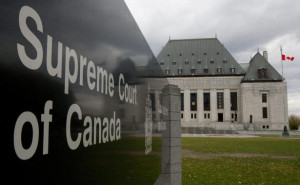 (Editorial from Spring, 2012 edition of “News of Quebec”, the trimestrial missionary news publication of the Assemblies of Christians in French Canada, used with permission by the author, Richard E. Strout)
(Editorial from Spring, 2012 edition of “News of Quebec”, the trimestrial missionary news publication of the Assemblies of Christians in French Canada, used with permission by the author, Richard E. Strout)
The Supreme Court Decides
On February 17, 2012, the Supreme Court of Canada in a 9-0 ruling upheld the right of Quebec’s Ministry of Education to require that all elementary and secondary school children be obligated to follow the controversial Ethics and Religion course introduced into the Quebec school system as of 2008. According to Christianity Today, the court ruled that since the program was educational and was not forcing children to join any religion, it did not infringe on religious freedom.
The course teaches religion from a secular point of view, putting all faith systems on an equal footing. Bible stories are treated as legends and Christianity is presented as just one among many of the legitimate cultural expressions of our time. In the words of the court,
“… early exposure of children to realities that differ from those in their immediate family environment is a fact of life in society. The suggestion that exposing children to a variety of religious facts in itself infringes their religious freedom or that of their parents amounts to a rejection of the multicultural reality of Canadian society and ignores the Quebec government’s obligations with regard to public education.”
Since its inception, the introduction of this course has been opposed by parents and leaders of various Christian expressions, both Catholic and Protestant. Already over 2000 parents are said to have raised objections, among them parents of two children in Drummondville, Quebec, who requested of the local school board that their children be exempted. Following the school board’s refusal, the loss of their case before the Quebec Superior Court and a refusal by the Quebec Court of Appeals to hear the case, it was taken to the Supreme Court.
Some organizations within the province of Quebec have opposed the introduction of this curriculum by legal action, public manifestations and the like. On the other hand, The Protestant Partnership in Education has endeavored to work closely with the Quebec Ministry of Education to introduce changes into the program in order to make it more compatible with evangelical convictions. Thankfully, there has been a good spirit of give and take and some progress has been made over the years. This said, however, in the minds of many if not most Quebec evangelicals, the Ethics and Religion course is still very far from being acceptable.
The Canadian Council of Christian Charities (CCCC), one of the numerous interveners in the case before the Supreme Court, expressed its concern with the court’s decision lest it “set a precedent allowing provinces to implement a particular mandatory religion course of their choosing at the expense of violating the religious sensibilities of Christian schools and their supporters.” The CCCC goes on to say that, in their view, “the religious curriculum in question favours one particular vision of religion that of the Quebec government at the expense of the vision of the parents who objected.”
This is by no means the first time that the education of evangelical protestant children has been a matter of concern for parents and leaders here in Quebec – see my editorial in the Spring 20 I 0 issue of this magazine. One has only to return to the 1950s and 1960s and right back into the nineteenth century when education was in the hands of the predominant church. Ways were ultimately found for circumventing the problem but they were costly, both in terms of money and the persecution of the French evangelical minority. Today it has become a Church-State issue rather than a confessional one; however, the stakes are much the same.
Happily, materials have been and continue to be prepared to be placed in the hands of Christian parents which will enable them to counteract the negative influences of this required curriculum. We can only hope that parents will avail themselves of such materials and step up to the plate as concerns their God-given responsibility to see to the proper religious education of their children. …
Brethren, pray for us.
